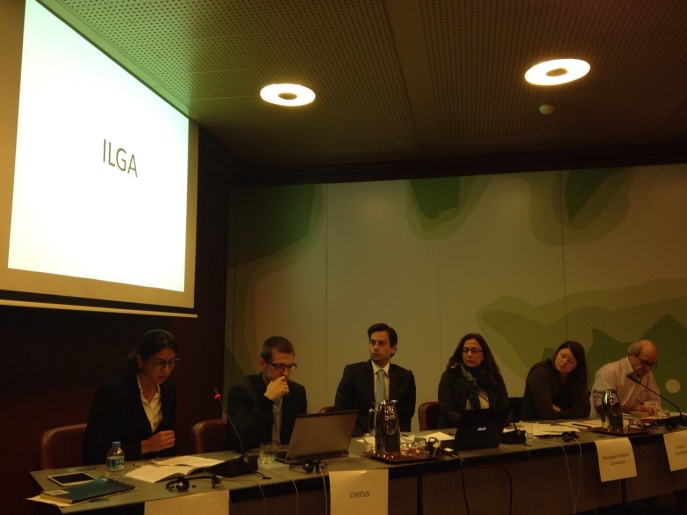Statement delivered by Kaos GL’s Ezgi Kocak on December 3, 2014 in Geneva to Permanent Delegation of the European Union to the United Nations on behalf of Kaos GL, LGBTI News Turkey, IGLHRC, and ILGA World.
Dear colleagues and representatives of the European Union,
Thank you for giving us the opportunity to be part of this meeting and to present the situation of lesbian, gay, bisexual, and trans individuals in Turkey. We represent the coalition of organisations (Kaos GL, LGBTI News Turkey, and the International Gay and Lesbian Human Rights Human Rights Commission).
At the first-cycle of the Universal Periodic Review, Turkey accepted recommendations by Norway and the Netherlands for non-discrimination based on sexual orientation and gender identity. Furthermore, Turkey accepted the Czech Republic’s recommendation to review national legislation on non-discrimination with regard to women and gender identity. However, Turkey has failed to implement these recommendations and have instead moved in the opposite direction.
Despite the Turkish government’s commitments made during the first UPR and in spite of the collective efforts of the Turkish and international civil society organisations over the past four years, no anti-discrimination legislation – in line with the UN and the CoE norms and standards- has yet been put into the legislative process. Particularly, the terms “sexual orientation” and “gender identity” were not included in the 6th Democratization Package of February 2014 that includes the Anti-Discrimination Bill and regulations on the basis of Hate Crimes. Furthermore, no reference to sexual orientation and gender identity were included in the Article on Equality of the New Constitution’s draft.
Article 90 of the Constitution of the Republic of Turkey stipulates that international agreements duly put into effect have the force of law. The non-discrimination article of the Istanbul Convention, which Turkey ratified in November 2011, includes the terms “sexual orientation” and “gender identity”. This means that Turkey must fulfil its international obligation to bring its domestic laws in line with this convention to ensure the protection of LGBT individuals, something that the government in Ankara has so far refused to undertake.
Finally, Turkey’s 2014 Progress Report complements our UPR submission and highlights equality and non-discrimination, right to life and security of the person, administration of justice, including impunity and the rule of law issues where the Turkish government fails to address in order to improve the human rights situation in Turkey for all citizens including LGBT individuals.
Recommendations
We respectfully request that the issue of protection of all individuals regardless of their sexual orientation and gender identity is raised during the upcoming UPR session and that the following recommendations are made to the government of Turkey:
- Include the terms “sexual orientation” and “gender identity” in constitutional clauses on equality and non-discrimination, as well as in hate crimes legislation.
- Conduct full and independent investigations into all allegations of harassment, violence, or abuse of LGBT individuals, and prosecute perpetrators.
- Monitor, aggregate, and publish data on the number of complaints of violence against members of the LGBT community.
- Provide legal protection and equal treatment for LGBT people who have faced discrimination and abuse due to their actual or perceived sexual orientation and/or gender identity.
- Take all administrative measures, both on national and local levels, to prohibit and prevent discrimination on the basis of sexual orientation and gender identity, in order to provide effective protection of LGBT persons in Turkey.
- Provide mandatory trainings on the international standards of non-discrimination to government officials, police, military, prison/detention staff and to the judiciary with specific emphasis on sexual orientation and gender identity.
- Ensure that an individual’s mere existence as an LGBT individual is never considered “unjust provocation” of a criminal act, nor “contrary to law and ethics”.
- Cease to categorise homosexuality and transsexuality as illnesses of any sort.
- Guarantee the freedom of speech and association for LGBT community members and their allies.
- Provide mandatory training for all personnel working with refugees, asylum-seekers, and temporary guests on UNHCR guidelines regarding LGBT individuals.

